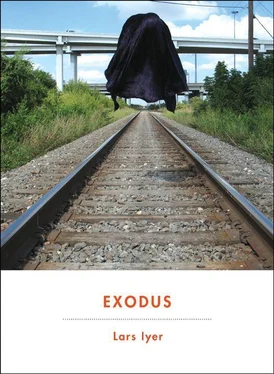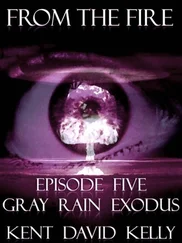They’re keen in their way, his students, W. says. They want to do well. But he’s having trouble impressing them with the majesty of thinking . He’s having trouble making them understand the despair of the world .
At least there are still a few of his postgraduates around, W. says. At least he still has some allies. One day, they might make a last stand, W. says. They might occupy the gym and trample the cricket pitch. He’s been trying to encourage them.
And in the meantime? He roams the corridors that used to echo with the great names. He walks through the empty quadrangle where he used to talk Kant with his colleagues. He sits alone in the refectory, where fellow scholars used to discuss Luhmann and Ellul over their sandwiches, and wanders past the empty offices where he used to have reading groups with other academics, puzzling over Prigogine together, pondering Michel Serres …
Of course, they’re going to close all humanities courses in British universities, W. says. It’s like the ’80s over again: protests and strikes, departmental closures and redundancies. It was a terrible time, W. says.
But at least the government recognised philosophy as the enemy in the ’80s, W. says. At least they understood the power of philosophy. The humanities are the enemy of capitalism: that’s what they understood in the ’80s. Philosophy is the eternal adversary of capitalism …
But now? The government no longer understands the humanities as an enemy, W. says. The government has nothing in particular against philosophy. They do not oppose it on ideological grounds, nor because they suspect it of subversion . They are not concerned that philosophy is training insurgents of thought .
They’re simply going to marketise education , W. says. They’re simply going to turn the university over to the free market, just as they are turning all sectors of the public services over to the free market. They’re going to submit philosophy to the forces of capitalism …
Sometimes, W. is tempted by the idea that philosophy might be liberated by its destruction. That, extinguished in the universities, philosophy might soar into its own sky, free of every institutional encumbrance.
Perhaps there will be a new age of thinker-Cynics, former academics, living on the streets and speaking truth to power , W. thinks. Perhaps new Socrateses will question empty-headed yuppies in the marketplace …
But then W. reminds himself that in the future, the streets will be sold off, and all public spaces privatised. That the empty-headed yuppie is only a function of the system . That capitalism has no face, and that the financial markets are only a simmering chaos .
What kind of Cynic could speak truth to a function? What new Socrates could be a gadfly to simmering chaos ?
Reading his redundancy letter, W. felt like the dying Rutger Hauer in Bladerunner , he says. ‘ I’ve seen things you people wouldn’t believe ’, Hauer said to his murderers. ‘ Attack ships off the shoulder of Orion. C-beams glittering in the dark near Tannhauser Gate …’ Hasn’t W. seen things his sackers wouldn’t believe? He’s leant on a piano at which Cornelius Castioriadis sang revolutionary songs, at an Essex postgraduate party. He’s watched Jean-François Courtine in full flight, writing in Arabic on a Sorbonne blackboard, from right to left. He’s heard the legend of Chouchani, from Levinas’s own lips, over cups of tea in a Paris apartment …
Didn’t his managers understand what he’d seen? W. says. Didn’t they know that he was part of the legendary generation of Essex postgraduates ?
Morning. Leazes Park, Newcastle. This is where I should come when the ping of incoming emails depresses me, W. says. I should rest my gaze on the waterfowl: the black-headed geese, the kingly swans. I should hire a rowing boat to take a turn around the lake. Above all, I should walk …
A man must walk if he is to think, W. says. We have to be receptive to thoughts, open to them; an idea might come to us at any time, and it’s only when we relax — when we let the mind stretch out — that it can reach us. How many times has W. walked out alone, hoping that an idea would come looking for him?
W. goes to the tulip garden at Mount Edgcumbe when he wants to think, he says. Off he sets in the morning, with his Kafka and a notebook in his man bag, heading up to the Naval dockyards, and then catching the ferry across the Tamar. On the other side, it is only a short walk to the tulip garden, which he approaches through the orangery, then the English garden and then the French garden, he says. But it is the tulip garden which is his destination, W. says, whether it’s spring or summer, or, for that matter, autumn or winter; whether or not there is anything in flower.
We must not so much look for ideas, W. says, as let ideas find us. It is not a question of mental effort , but of mental slackening , he says. Ideas need time to emerge — unmeasured time. Ideas despise clocks. They even despise notebooks.
Lately, W. has been deliberately neglecting his notebooks. He’s put them aside, he says, all the better for ideas to reach him. W.’s even been neglecting himself! Is it any accident that Solomon Maimon was taken for a vagrant?
Is it because he thought I was a thinker-vagrant that he was drawn to me? W. wonders. I was certainly scruffy enough, unkempt enough … But these signs of vagabondage were unaccompanied by signs of thought. The vagrant is not necessarily a thinker: it was a painful lesson, W. says.
Solomon Maimon was dirty!: that’s what I always protest to W. when he reprimands me for my personal habits. But Maimon was a genius! W. cries. A genius driven out of his home city for daring to philosophise. A beggar-genius living on alms, as he wandered for years before being offered a position as a tutor.
Was it in those years that Maimon formulated the most decisive criticisms of Kantian thought that have been made? Was it then, his begging bowl before him, and Kant’s three critiques in his knapsack, that ideas came to him, which, in his final years, he would publish in a series of essays?
Only Maimon understands me, Kant said, after reading his unkempt admirer’s Transcendental Philosophy in manuscript. And when Kant died, it was suspected that among the causes of his death was Maimon’s devastating criticism of his work. How could he, Kant, survive an attack by the ragged philosopher ?
But Maimon never succeeded in penetrating academic circles, nor even the salons of enlightened Berlin Jews. To them he was of the Ostjude , his manners too rough, his jerks and tics too disconcerting, his speech stammering and garbled. And he was a difficult man, lacking in manners, brusque and intolerant when he should have been diplomatic.
And he smelt awful, everyone said that. Maimon stinks! Get him out of here! : that’s what you’d hear in Berlin salons. And out he went, back onto the frozen streets, back outside with the three critiques in his knapsack …
Maimon was an alcoholic, of course. He drank like a madman, W. says. He drank himself to death even when he found employment as a tutor, even as great essay after great essay poured forth from his pen.
Is that what’s going to happen to me? Am I going to produce a great stream of books in my final years, which can’t be far off? W. says. He’s offered me support, and now he’s waiting. He brought me in from the cold, and now he’s sitting by expectantly. But he thinks he’s going to be disappointed.
W. stops to read the plaque about waterfowl. There’s usually a melancholy to the urban park, he says, but Leazes Park is different. It’s more vibrant, somehow. We look around us: the empty bandstand, the high wall of St James’s Park, goths and emo kids drinking cider in the sun … It all harbours some great clue to life, W.’s strangely certain about that, or maybe it’s the effect of the coffee I made for him this morning.
Читать дальше












